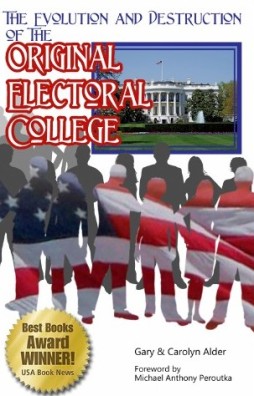12th Amendment
[Proposed 1803; Ratified 1804]
The Electors shall meet in their respective states, and vote by ballot for President and Vice-President, one of whom, at least, shall not be an inhabitant of the same state with themselves; they shall name in their ballots the person voted for as President, and in distinct ballots the person voted for as Vice-President, and they shall make distinct lists of all persons voted for as President, and of all persons voted for as Vice-President, and of the number of votes for each, which lists they shall sign and certify, and transmit sealed to the seat of the government of the United States, directed to the President of the Senate; – The President of the Senate shall, in the presence of the Senate and House of Representatives, open all the certificates and the votes shall then be counted; – The person having the greatest number of votes for President, shall be the President, if such number be a majority of the whole number of Electors appointed; and if no person have such majority, then from the persons having the highest numbers not exceeding three on the list of those voted for as President, the House of Representatives shall choose immediately, by ballot, the President. But in choosing the President, the votes shall be taken by states, the representation from each state having one vote; a quorum for this purpose shall consist of a member or members from two-thirds of the states, and a majority of all the states shall be necessary to a choice. And if the House of Representatives shall not choose a President whenever the right of choice shall devolve upon them, before the fourth day of March next following, then the Vice-President shall act as President, as in the case of the death or other constitutional disability of the President. – The person having the greatest number of votes as Vice-President, shall be the Vice-President, if such number be a majority of the whole number of Electors appointed, and if no person have a majority, then from the two highest numbers on the list, the Senate shall choose the Vice-President; a quorum for the purpose shall consist of two-thirds of the whole number of Senators, and a majority of the whole number shall be necessary to a choice. But no person constitutionally ineligible to the office of President shall be eligible to that of Vice-President of the United States.
* * * * * * *
Analysis
In the original Constitution it was assumed that the electors would act independently to nominate their two best choices for president. By this time political parties had largely taken over and were now trying to make the electoral process more closely support their desired outcome. Rather than having independent electors nominate (the original proposal of an individual as a candidate), the parties started to put together a president/vice president “ticket” and then push to have the electors nominate (ratify or endorse) that pre-determined choice. The electors were now becoming party pawns. This concept is foreign to Article II of the Constitution.
The purpose of this amendment is to avoid a tie for the presidency between a “de facto” presidential candidate and a “de facto” vice-presidential candidate. The 12th Amendment attempts to make this “de facto” situation explicit, requiring the electors to make one vote for president and one for vice-president and thus avoid the deciding vote of the House of Representatives. After the election in 1800 between Thomas Jefferson and Aaron Burr which took 36 ballots in the House of representatives, there was a feeling that allowing a House vote should be avoided at all costs. The House (voting by state) might not have the same sentiment as the parties making the nomination through the manipulation of the electoral system. The truth is that the Constitution was built on the assumption that there would be no political parties and no campaigning for the office of president, but now both parties and presidential campaigning were the rule of the day.
The job of the presidential electors as described in Article II of the Constitution was to nominate individuals, up to 5 of whom would later become presidential candidates. One of the candidates would become president and another would become vice-president. Volume 5 of The Founders’ Constitution in the section on the 12th Amendment provides some great insight to the various opinions existing on this subject as early as 1803. Document 5 contains part of the *debate in the Senate relating to the 12th Amendment. Please note that even at this early date, a few of the senators understood the concept and intent of the electoral system, but most of them were totally clueless.
One of those who understood and defended the system as defined by Article II of the Constitution was Senator Uriah Tracy of Connecticut.
-* Senate Speech opposing the 12th Amendment
To review many of the Senators’ speeches use the following:
-* Senate Debate on the 12th Amendment
While the concern of a tie among candidates having the vote of a majority of the electors was not likely with an independent vote of the electors, it was very real in a “ticket” situation, the tie would most likely be between the individuals on the same ticket as was the case in 1800. Thus it wasn’t a weakness in the constitution that was being “corrected” but rather this was an effort to accommodate the abuses being perpetuated by the political parties.
Actually, the solution outlined in the 12th Amendment makes it extremely more unlikely that over half of the electors would independently choose that ticket if there were more than 2 parties or if there were multiple tickets per party. By having the electors cast 1 vote for president and 1 for vice-president it reduces the presidential nominations to 1 per elector instead of 2. Having half as many possible nominations but still requiring the vote of a majority of the electors makes it almost impossible to achieve that majority. If the situation is complicated with the idea that at least some of the electors from the home state of the vice-presidential candidate might think him more worthy of being the president, it becomes more unlikely yet that a president would be selected without the vote of the House. Thus without large scale manipulation in the process, the likelihood that the final decision would be made by a vote in the House would drastically increase rather than decrease.


